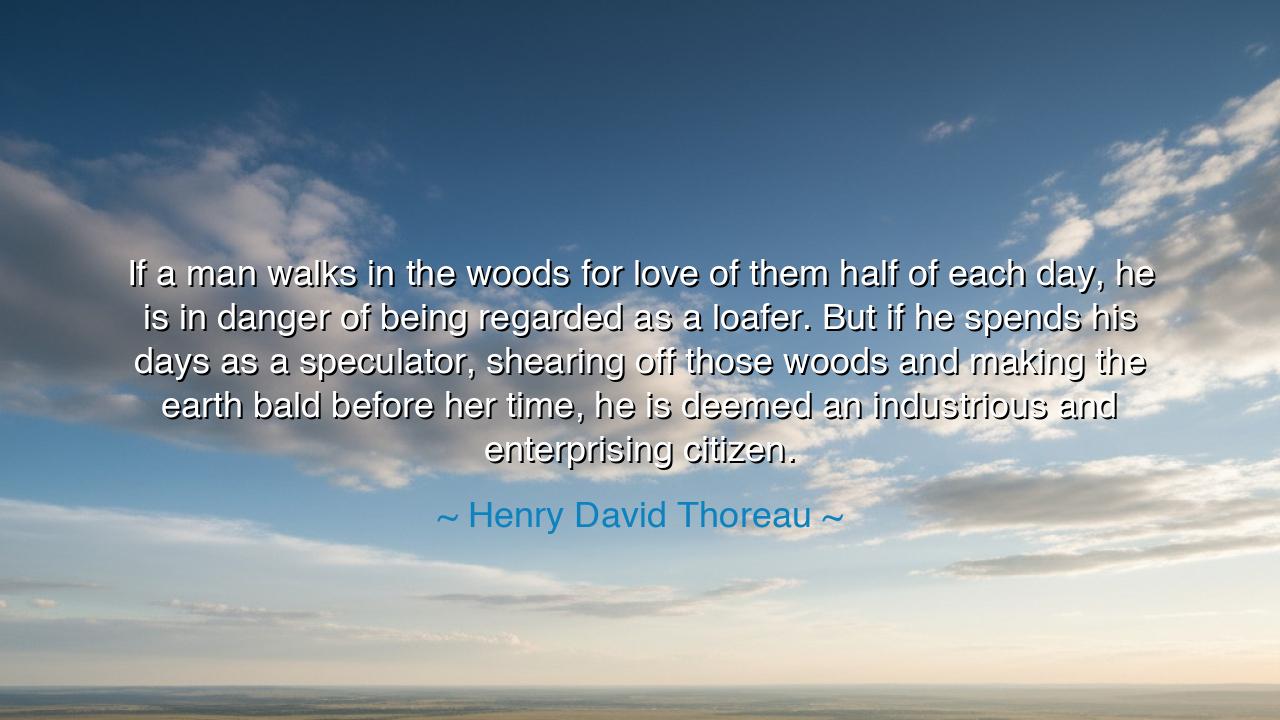
If a man walks in the woods for love of them half of each day, he
If a man walks in the woods for love of them half of each day, he is in danger of being regarded as a loafer. But if he spends his days as a speculator, shearing off those woods and making the earth bald before her time, he is deemed an industrious and enterprising citizen.






When Henry David Thoreau wrote, “If a man walks in the woods for love of them half of each day, he is in danger of being regarded as a loafer. But if he spends his days as a speculator, shearing off those woods and making the earth bald before her time, he is deemed an industrious and enterprising citizen,” he was speaking not only of his own time, but of all time. His words pierce through centuries with the sharpness of a moral blade. He saw, with the eyes of a prophet, the tragedy of a world that confuses greed for virtue and calls destruction by the name of progress. In his lament, Thoreau exposes the blindness of civilization—the belief that the worth of a man is measured by what he consumes rather than what he cherishes.
Thoreau wrote these words in the 19th century, during the rise of industrial America, when the forest was falling to the axe and the rivers were being bound by mills. He had fled the noise of the towns to dwell by Walden Pond, seeking the deeper rhythm of nature and the quiet wisdom of solitude. Yet even then, he saw the sickness spreading through the soul of his nation: the worship of labor without love, of profit without purpose. A man who wandered for joy in the woods, who listened to birds and pondered the whisper of leaves, was dismissed as idle. But one who stripped the land bare, reducing living beauty to timber and coin, was praised as enterprising. Thus, Thoreau’s quote is both a rebuke and a mirror—it reveals how easily humanity confuses industry with virtue, forgetting that not all work is holy, and not all rest is waste.
The ancients would have understood Thoreau well, for they too knew the danger of excess. The Greek philosopher Heraclitus once said, “Much learning does not teach understanding,” meaning that progress without wisdom is ruin. The Romans, in their hunger for empire, cut down the forests of Italy and North Africa, believing they were expanding civilization—yet their soil turned barren, and the heart of their empire grew hollow. Thoreau saw America marching toward the same fate. To him, the man who “walks in the woods for love of them” is not lazy, but enlightened. For he recognizes the forest as a living cathedral, not a resource to be spent. Such a man labors inwardly—cultivating gratitude, reverence, and restraint—qualities far rarer and nobler than the toil that fills ledgers but empties the earth.
There is a deeper wisdom beneath Thoreau’s words: he reminds us that society’s praise often conceals its decay. What the crowd exalts is not always what the spirit should admire. The “industrious citizen” who clears the forest may gain wealth, but he impoverishes the generations to come. The “loafer” who walks among trees gains no gold, but he preserves the treasure of life itself. Thus, Thoreau turns the measure of worth upside down. He teaches that true labor is not the endless pursuit of gain, but the act of preservation, contemplation, and harmony with the natural order. To walk in love is to serve creation; to destroy for profit is to betray it.
Consider the story of John Muir, who came after Thoreau and carried his torch into the wild mountains of the West. Muir, too, was once ridiculed for spending his days wandering among trees and streams. Yet his “idleness” birthed a movement that would save countless acres of wilderness, leading to the creation of Yosemite National Park and the National Park System itself. The very man society might have scorned as a dreamer became a guardian of the nation’s soul. Meanwhile, countless “enterprising” men of his day, who plundered forests and rivers for profit, are now forgotten—dust upon the wind. Muir’s legacy endures because he followed Thoreau’s truth: that love of the Earth is the highest form of work.
Thoreau’s words are also a meditation on values and vision. He asks us: what kind of world do we labor to build? One that glitters with wealth but gasps for breath, or one that thrives in balance and beauty? The danger he foresaw—the glorification of exploitation—is the very crisis that defines our modern age. The forests he mourned are now the rainforests of the Amazon; the “enterprising citizens” are corporations that strip the earth with machines far mightier than axes. Yet still, the wisdom of his warning stands: if we continue to call destruction progress, we will inherit a desert where once stood paradise.
So let the lesson of Thoreau be this: reverence is the highest form of labor. Do not measure worth by the noise of production, nor by the weight of gold, but by the depth of harmony between human and nature. Walk in the woods—not in conquest, but in communion. Learn again to see trees not as timber, but as teachers; rivers not as resources, but as lifelines. Let society call you idle if it must—for it is better to be still with purpose than busy with ruin. For in truth, the one who walks the woods for love of them is not a loafer but a keeper of the world’s soul, and from such love alone can the Earth, weary and wounded, learn to heal again.






AAdministratorAdministrator
Welcome, honored guests. Please leave a comment, we will respond soon